A workshop on Artificial Intelligence in Oral Cancer was organised to bring together partners and stakeholders who could contribute to the call from the Ministry of Education for consortium-based proposals from higher education institutions on Artificial Intelligence (AI) for Healthcare. The desired outcome of the workshop was to identify tangible, demonstrable improvements and targets for a successful proof-of-concept on oral cancer.
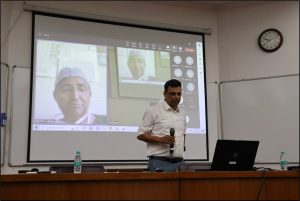
The workshop was hosted in the Department of Electrical Communication Engineering, Indian Institute of Science, Bengaluru on 7 December 2023. The event was attended by 32 persons, including the following main collaborators from the Indian Institute of Science, the Oral Cancer Task Force (OCTF), Bengaluru, and oral cancer researchers from across India. The sessions were grouped to allow the OCTF representatives to present their views first, followed by the All India Institute of Medical Sciences group, New Delhi. The Diagnosis Technology session was hosted thereafter, followed by a general discussion.
Online
In-person
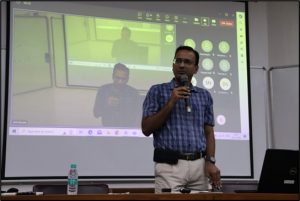
The workshop started with a welcome address by Prof Rajesh Sundaresan. He explained the background of the workshop, the impact of artificial intelligence in health care, and the reason for focussing on oral cancer. Dr Moni Abraham Kuriakose stressed on the importance of completing the care continuum and navigating the patient from the point of diagnosis to the point of care (POC). Dr Vijay Chandru suggested leveraging the advances and lower costs associated with molecular profiling for early detection. He said that imaging data and phenotypic data together would lead to strong capabilities of prediction and data analytics. Dr Anupama Shetty pointed out that the outcome should translate for frontline health care workers in low-resource settings.
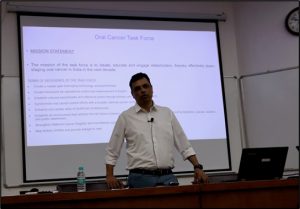
Dr Praveen Birur explained that there is a huge drop from diagnosis to follow-up because of ‘cancer phobia’—a fear of getting diagnosed—even though there is awareness. Another reason for the very low translation to biopsy is that many patients are asymptomatic. As 20% of cancer is non-habit induced, adding risk factors such as habits and lesions may induce bias into the model, while the current images are very representative. Currently, none of the AI models can work independent of a remote specialist. He also spoke about the necessity for a tool that is low scale, cost effective, and non-invasive. Dr Keerthi spoke about oral pre-cancer screening using a mobile phone and its advantage in reducing the burden on specialists and decreasing the turn-around time for diagnosis. She also pointed out the challenges such as the skill of the person and the clarity of the image. She then described a study that included a comparison of imaging using white light and auto fluorescence and evaluation of the intensity consistency on first screening and follow-up.
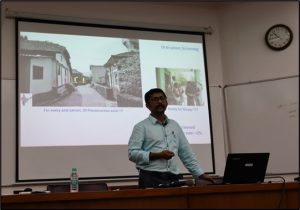
Dr Sumsum P Sunny indicated that different POC devices are required for primary, secondary, and tertiary health care centres. He emphasised the importance of diagnosis and the role played by AI (as interpreting precancerous lesions will be of great assistance to clinicians). Dr Amritha Suresh stressed on a minimal invasive method for screening and leveraging the difference in the molecular pattern that exists between low-risk and high-risk patients. Mr Arvind Sivaramakrishnan spoke about the data inadequacies in cancer care and described the Karkinos K-Cloud platform that enables a multi-modal data repository.
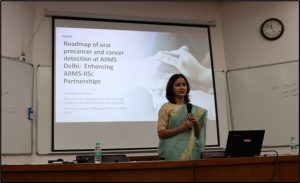
The multiple initiatives undertaken by the All India Institute of Medical Sciences in oral pre-cancer and cancer detection were described by Dr Deepika Mishra. These include the development of online training manuals, generation of medical imaging datasets (MIDAS) for tobacco-induced oral lesions, and an AI-based tool for automated detection of oral cancer and precancer. Dr Varun Surya elucidated the role of AI in each of the four stages that oral cancer patients go through, namely, screening, diagnosis, treatment and follow-up. Dr Punnya Angadi Rao shared some experiences in applying AI in oral cancer and emphasised that AI can provide non-invasive, portable, easy-to-use, rapid, cost-effective techniques that do not require a skilled professional to process, analyse, and interpret the test results.
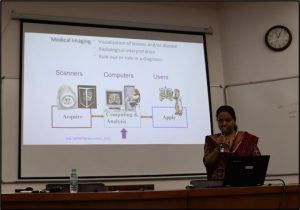
Dr Raji Susan Mathew spoke about AI-based POC oral precancer screening using a mobile phone and the challenges in AI-based medical imaging. Prof Prabhdeep Kaur described the medical system in India, the need to supplement screening programmes with effective follow-ups, and a patient-centric approach. She stressed on a holistic team-based approach involving different stakeholders, simplified training models, and testing interventions in diverse contexts.
During the discussion after the presentations, the attendees identified a focus area on which the consortium proposal would be based.
